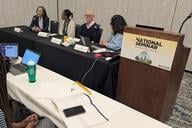You have /5 articles left.
Sign up for a free account or log in.
WASHINGTON -- A divided National Labor Relations Board has requested that legal briefs be filed on whether faculty members at private colleges should be considered employees eligible for collective bargaining.
While the board's action is just one step in what would be a long process, the statement suggests a willingness to reconsider the idea that the 1980 decision NLRB v. Yeshiva University should continue to effectively bar unionization at private colleges and universities. Under that decision, faculty members at private institutions have generally been considered to be managers (and thus ineligible for unionization) because of their role in the shared governance of their institutions. (Unionization of faculty members at public institutions is governed by state law, and is permitted by some states and barred by others.)
Advocates for faculty unions have long viewed the Yeshiva decision one of the most serious roadblocks they face, and some have hoped for a vehicle either to overturn it or to limit its force. The NLRB appears to be trying to provide such an opportunity.
"There's no question about it. They are going after Yeshiva," said Richard Boris, director of the National Center for the Study of Collective Bargaining in Higher Education and the Professions at Hunter College of the City University of New York. "I think this is very significant."
At the same time, he predicted that if the NLRB's inquiries lead it to start certifying faculty unions at private colleges, such institutions would sue. "This would end up back at the Supreme Court," he said. (Movement in that direction may also rely on President Obama being re-elected, as Republican appointees to the NLRB would likely not pursue the case.)
The NLRB has issued the request for comments in the context of an attempt -- started by faculty members at Point Park University, a private institution in Pittsburgh, to be represented by the Communications Workers of America. The union first sought recognition in 2003, but the U.S. Court of Appeals for the District of Columbia ruled in 2006 that it could not back the union drive unless the NLRB provided detailed reasons why the Yeshiva precedent should not apply. That is what the NLRB is now attempting to do, citing a request from a regional board official about certifying the Point Park union.
Critics of the Yeshiva ruling said that it overstated the extent of faculty power at private institutions. Other critics have said that even if the Supreme Court ruled correctly on the status of faculty members at Yeshiva University, there is such wide variation in the degrees of shared governance that the decision never should have applied to private colleges generally. And still others have argued that in the years since 1980, faculty members at most private colleges have lost much of their power in shared governance, and so shouldn't be covered.
In its request for briefs, the NLRB asks a series of questions, and they seem consistent with the criticisms that have been made over the years of the Yeshiva ruling. For instance, one question is: "Have there been developments in models of decision making in private universities since the issuance of Yeshiva that are relevant to the factors the board should consider in making a determination of faculty managerial status? If so, what are those developments and how should they influence the board’s analysis?"
Another question is: "[A]re there useful distinctions to be drawn between and among different job classifications within a faculty -- such as between professors, associate professors, assistant professors, and lecturers or between tenured and untenured faculty -- depending on the faculty's structure and practices?" And another question: "What evidence should be required to establish that faculty make or effectively control decisions?"
Boris said that the questions suggest interest by the NLRB in establishing a series of tests that might be used to declare that faculty members at many private institutions could be considered non-managerial employees, even without Yeshiva being overturned. In essence the NLRB could be saying that many private colleges are too different from Yeshiva in 1980 to consider that the Supreme Court decision still applies.
At many private colleges, Boris said, it would be relatively easy for professors to demonstrate that they have much less power than they did in 1980. "There's no question that faculty rights have been truncated almost everywhere," he said.
Opposition Expected
The NLRB notice that requested briefs be filed also includes evidence of how charged these issues remain. Three NLRB members signed the request for briefs. Two others signed a dissent saying that there was no reason to seek additional briefs in the Point Park case. (The NLRB has been sharply divided in recent years, with Republicans using filibuster power to block nominees of President Obama, and Republicans in both the House and Senate periodically threatening to legislatively overrule some of the board's actions.)
The dissent noted that a brief filed in the case earlier by the American Council on Education, the National Association of Independent Colleges and Universities, the Council of Independent Colleges and the Association of Independent Colleges and Universities of Pennsylvania opposed a faculty union at Point Park. The brief argued that faculty members at private colleges do have considerable power, especially on matters related to the curriculum, and that instances in which faculty members may be overruled on issues does not mean that they should be viewed as employees would be elsewhere.
"Sensitive to the uniqueness of academia, the Supreme Court recognized in Yeshiva that in the university context, managerial authority is more shared and less of a hierarchical pyramid than in the more typical industrial model," the brief says. "This distinction precludes a rote application of the board’s managerial standards as developed in the industrial context, but it does not permit the board or its regional directors to impose stricter standards and require an absolute delegation of authority as a condition to finding that faculty act in a managerial capacity." The brief adds that "Yeshiva counsels that managerial authority is not to be reviewed in absolutist terms."
Ada Meloy, general counsel of the American Council on Education, said via e-mail Wednesday evening that the issues raised in the brief remain relevant. "It is fair to say the amicus brief still reflects our views. We do not think the NLRB can vary from what the Supreme Court has said in the Yeshiva case," she said.




